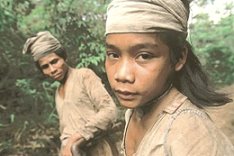Some days, like today, I am fortunate in being able to come home by bus. As the route terminates just beyond my office I get a seat, an open window to catch the breeze and the pleasure of paying a mere 5% of the expected taxi fare.
Of course, there is the problem of that open window which allows the intake of noxious fumes. Still, if I care to come out of the cocoon of stoicism I surround myself with, generally with a good book, I can gaze at pretty girls and the other facets of city life. A musing time, as it were.
Today was briefly different and it wasn't because the buskers were actually musical. The best ones always travel by train.
What caught my eye were two identically dressed barefoot men, possibly in their thirties, navigating their way southwards along the footpath, where it existed. They wore black shorts, from which protruded muscular legs, and white-ish shirts with a sweatband made from the same rough cloth. They had tote bags, of the same material, slung behind them. They seemingly ignored those of us sweltering in the gridlock
I realised that this was my first sighting of the semi-mystical Badui. I had heard of this group of some 5,000 - 8,000 people, and knew that they live in West Java, about 120 km from Jakarta, in the Kendeng mountains at an elevation of 300-500 meters above sea level. Their homeland is contained in just 50 km² of hilly forest area.
I also knew that there are two groups of Badui, the Inner and the Outer. No foreigners were allowed to meet the Inner Badui, though the Outer Badui do foster some limited contacts with the outside world.
The Baduis observe many mystical taboos. They are forbidden to kill, steal, lie, commit adultery, get drunk, eat food at night, take any form of conveyance, wear flowers or perfumes, accept gold or silver, touch money, cut their hair. Other taboos relate to defending Badui lands against invasion: they may not grow sawah, use fertilizers, raise cash crops, use modern tools for working ladang soil, keep large domestic animals.
That much I was aware of and that the 'modern world' is inevitably eroding their lifestyle.
The Badui Luar (Outer) make up the remainder of the Badui population, live in 22 villages acting as a barrier to stop visitors from entering the Sacred Inner circle. They do follow the rigid taboo system but not as strictly as the Dalam (Inner), and they are more willing to accept modern influence into their daily lives. For example, some Luar people now proudly sport the colorful sarongs and shirts favored by their Sundanese neighbours.
In the past the Badui Luar only wore only their homespun blue-black cloth, and were forbidden to wear trousers. Other elements of civilization (toys, money, batteries) are rapidly infiltrating especially in the villages to the north, and it is no longer unusual for an outer Badui to make a journey to Jakarta, or even to work outside as a hired hand during the rice planting and reaping seasons.

I cannot judge where these two were heading. Perhaps to Bandung?
I only ask because in 1997 Sabah Habas Mustapha, whose English name is Colin Bass, recorded an album of Sundanese music, Jalan Kopo, there. The lyrics of the first song on the CD are about his encounter with a Badui.
In a "Masakan Padang" restaurant I noticed a sprightly looking old man with laughing eyes chuckling to himself. His skin was clear and healthy, he wore a black smock over a white shirt and his strong, muscular legs protruded from his traditional batik sarong. When he saw me his face broke into a hearty laugh. "You like that?" he said, "Ok for some but all this driving drives you crazy, this my transport." He patted the soles of his bare feet.
I asked him in which direction he was travelling. "To Bandung, to visit a friend, do a little business" he replied in the modest but confident tone of a man at peace with himself, "And you? You want to walk too?", he laughed, his radiant, gap-toothed smile gently mocking my superficial understanding of his world. I bade him good journey and returned to my squid.





